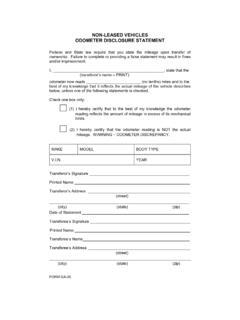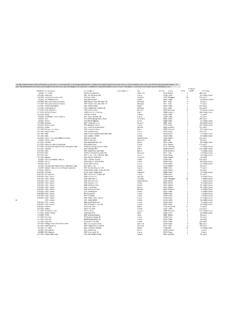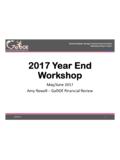Transcription of GEORGIA LANDLORD TENANT HANDBOOK - …
1 GEORGIA . LANDLORD TENANT . HANDBOOK . A LANDLORD - TENANT Guide to the State's Rental Laws Revised December 2017 . GEORGIA LANDLORD - TENANT HANDBOOK |1. Introduction This HANDBOOK is designed to provide an overview and answer common questions about GEORGIA residential LANDLORD - TENANT law. The information in this HANDBOOK does not apply to commercial or business leases. The facts in each case determine the proper solution for a problem. Because facts in each case are different, this HANDBOOK covers general terms and answers, and may not apply to your specific problem. While this publication can be helpful to both landlords and tenants, it should not be a substitute for professional legal advice. This HANDBOOK contains information on GEORGIA LANDLORD - TENANT law as of the revision date and may not reflect the current status of the law. Before relying on information in this HANDBOOK , the underlying law should be independently researched and analyzed in light of your specific problem and facts.
2 In GEORGIA , there is not a government agency with power to intervene in a LANDLORD - TENANT dispute or force one party to behave a particular way. Landlords or tenants who cannot resolve a dispute need to use the courts, either directly or through a lawyer, to enforce their legal rights. The HANDBOOK is available on the internet from the GEORGIA Department of Community Affairs ( ). Finally, although this HANDBOOK provides a good overview of GEORGIA LANDLORD - TENANT law, those seeking additional resources may wish to review secondary legal resources that may be considered authoritative by the courts, including GEORGIA LANDLORD and TENANT by William J. Dawkins, which is available at most law libraries at GEORGIA superior courts or law schools. Table of Contents Relevant Law 3. Basic TENANT Rights 3. Entering into a Lease and Other Tenancy Issues 5. Submitting a Rental Application 5.
3 Reviewing and Signing a Lease 6. Problems during a Lease 10. Subletting 12. Early Termination 13. End of Lease 13. Security Deposit 14. Evictions 15. Miscellaneous 18. Military Service Members as Tenants 18. Lead Based Paint Disclosures 18. Foreclosure 19. Roommates 19. Manufactured and Mobile Homes 20. Sex Offender Registry 20. Appendix A: What if I am Evicted? 21. Appendix B: Text of Callout Boxes 26. Index 28. GEORGIA LANDLORD - TENANT HANDBOOK |2. Relevant Law Federal and state legislatures create laws that affect LANDLORD - TENANT relationships. Local counties and cities may also enact housing codes that affect rental property. Below is a list of relevant laws in GEORGIA . GEORGIA LANDLORD - TENANT Act. Title 44, Chapter 7, of the Official Code of GEORGIA contains laws passed by the GEORGIA Legislature that affect LANDLORD - TENANT relationships in GEORGIA .
4 GEORGIA Fair Housing Law. Title 8, Chapter 3, Article 4 of the Official Code of GEORGIA prohibits discrimination relating to the sale, rental, or financing of dwellings or in the provision of brokerage services or facilities in connection with the sale or rental of a dwelling based on race, color, religion, sex, disability or handicap, familial status, or national origin. Federal Fair Housing Laws protect persons from discrimination. Many Fair Housing Laws only apply to landlords or tenants receiving federal financial assistance, as noted below. o Fair Housing Act (Title VIII of the Civil Rights Act of 1968) prohibits discrimination in the sale, rental, and financing of dwellings, and in other housing-related transactions, based on race, color, national origin, religion, sex, disability or familial status. o Title VI of the Civil Rights Act of 1964 prohibits discrimination on the basis of race, color or national origin in programs and activities receiving federal financial assistance.
5 O Section 504 of the Rehabilitation Act of 1973 prohibits discrimination based on disability in any program or activity receiving federal financial assistance. o Title II of the Americans with Disabilities Act of 1990 prohibits discrimination based on disability in programs, services and activities provided or made available by public entities. o Age Discrimination Act of 1975 prohibits discrimination on the basis of age in programs or activities receiving federal financial assistance. o Section 109 of Title I of the Housing and Community Development Act of 1974 prohibits discrimination based on disability in any program or activity receiving federal financial assistance. o Architectural Barriers Act of 1968 requires that buildings and facilities designed, constructed, altered or leased with certain federal funds after September 1969 be accessible to and useable by handicapped persons.
6 County and City Ordinances may contain housing codes that affect rental property. Many ordinances are online ( ) or at your local county commission or city hall. In addition, courts may create law based on their interpretation of laws and prior court cases. These rules of law are commonly called Case Law, Common Law, or Judge-Made Law. Basic TENANT Rights DISCRIMINATION PROHIBITED. Landlords 1 cannot discriminate based on a person's protected class. Protected classes include race, color, religion, sex, national origin, familial status 2. or disability. 1 The Fair Housing Acts cover most housing. In some circumstances, the law exempts owner-occupied buildings with no more than four units, single-family housing sold or rented without the use of a broker, and housing operated by organizations and private clubs that limit occupancy to members. See Fair Housing-It's Your Right for more information.
7 2 Families in which one or more children under the age of 18 live with (1) a parent; (2) a person who has legal custody; or (3) a designee of the parent or legal custodian, with the parent or legal custodian's written permission. Family also includes pregnant women and anyone in the process of securing legal custody of a child under the age of 18. GEORGIA LANDLORD - TENANT HANDBOOK |3. Discrimination can take many forms, including: Refusing to rent to a person because he or she is a member of a protected class;. Engaging in conduct that discourages a person from renting or makes housing unavailable to a person because he or she is a member of a protected class (including failing to tell the person of marketing promotions, rent reductions or privileges or services associated with the complex);. Imposing different terms and conditions on members of a protected class.
8 Steering members of a protected class to particular buildings or units;. Excluding members of a protected class from advertisements;. Falsely telling a member of a protected class that a unit is not available; or Advertising or making any statement that indicates a limitation or preference based on a protected class. This prohibition applies to single-family and owner-occupied housing even if the housing is otherwise exempt from the Fair Housing Act. Discrimination can also be indirect, such as an apartment rule that appears neutral but is applied in a way that it causes a protected group to suffer more harshly. Unless the business owner has a legitimate business justification for the rule, then it is discrimination. In addition, it is illegal for anyone to threaten, coerce, intimidate or interfere with anyone exercising a fair housing right or assisting others who exercise that right.
9 Rights of Disabled Tenants. Fair housing also protects individuals with disabilities. Under the Fair Housing Act, landlords must make reasonable accommodations when necessary to allow equal access, permit reasonable modifications, and satisfy certain accessibility requirements. I. Reasonable accommodations. Landlords must modify rules, policies, practices, or services when a reasonable accommodation is necessary for a disabled person to use and enjoy a program or A TENANT or applicant dwelling. Reasonable accommodations may be necessary at all must request that the housing stages, including application, tenancy, or to prevent eviction. LANDLORD make the Disabled persons must either (1) have a physical or mental necessary accommodations. impairment that substantially limits one or more major life activities, An accommodation request (2) have a history of such an impairment, or (3) be regarded as can be made by the person having such an impairment.
10 With disability, a family Landlords should do everything they can to assist, but they are not member, or someone else required to make changes that would fundamentally alter the acting on the individual's program or create an undue financial and administrative burden. behalf. Examples of reasonable accommodations: Waiving a no pet policy for a TENANT who needs an assistive animal or providing an assigned parking place close to accessible apartments for a mobility impaired TENANT . II. Reasonable modifications. A LANDLORD must allow a disabled TENANT to make, at the TENANT 's expense, reasonable modifications or changes to his or her unit that are necessary to afford the disabled person full enjoyment of the premises. A TENANT may be required to restore the premises to their original condition upon vacating the unit, if reasonable. The LANDLORD must also permit reasonable modifications to common areas for accessibility.






